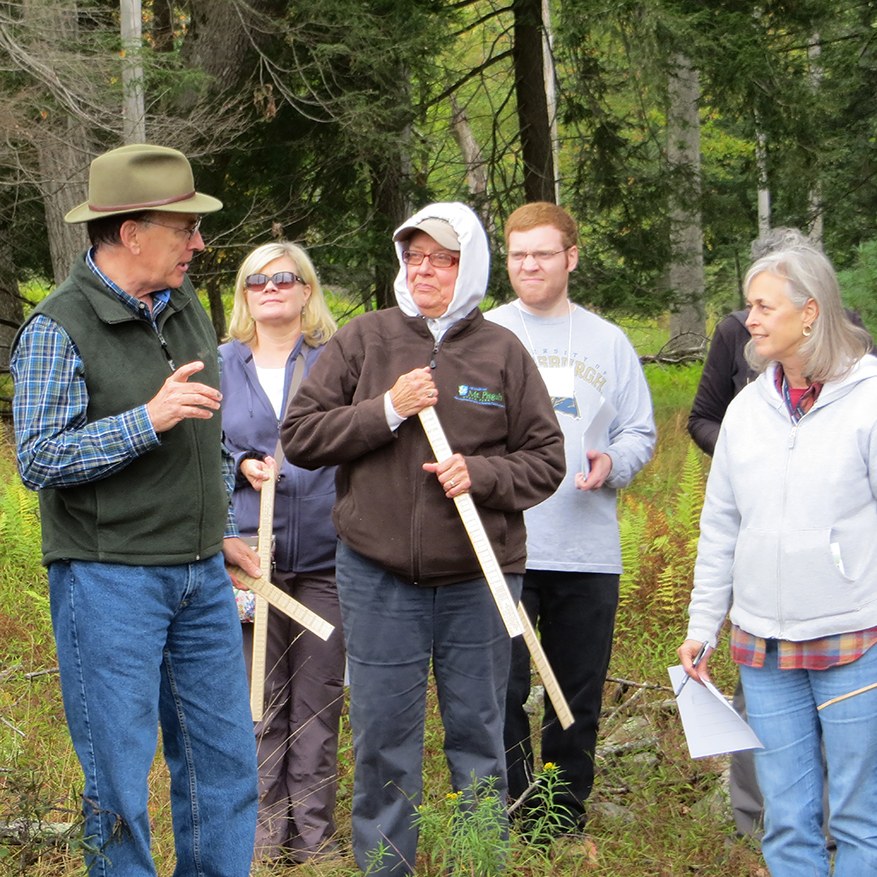Posted: November 21, 2022
Back in 2011, the late Professor Emeritus and Ibberson Chair Jim Finley co-founded the Center for Private Forests at Penn State with Allyson B. Muth, Ed.D. and other colleagues within the College of Agricultural Sciences. A legendary professor, Jim served for many years on the faculty of the Department and also co-founded the dual title degree program on Human Dimensions of Natural Resources and the Environment. Following his unexpected death in October 2021, and the University’s subsequent decision to rename the Center in his honor, the work of the Finley Center has taken on new urgency for its staff and volunteer Council.

James C. Finley
Back in 2011, the late Professor Emeritus and Ibberson Chair Jim Finley co-founded the Center for Private Forests at Penn State with Allyson B. Muth, Ed.D. and other colleagues within the College of Agricultural Sciences. A legendary professor, Jim served for many years on the faculty of the Department and also co-founded the dual title degree program on Human Dimensions of Natural Resources and the Environment. Following his unexpected death in October 2021, and the University’s subsequent decision to rename the Center in his honor, the work of the Finley Center has taken on new urgency for its staff and volunteer Council.
Below is an interview with Allyson B. Muth, Ed.D., Assistant Research Professor of Private Forests Management and Center Director, about the Finley Center and what comes next.
What are the foundations of the Finley Center’s work? As you may remember, Jim was a visionary academic scholar who recognized the importance of understanding the deep connections private forest landowners have to their land. His research sought to identify the values, attitudes, and practices of landowners as applied to their forest stewardship. The Finley Center was established to build on, share, and apply insights from this foundational research.
What projects is the Center currently working on? We are analyzing the results of the fourth study of forest landowners conducted by the Center and its predecessors. We are anxious to get the insights from this work into the hands of the academic institutions, Extension programs, government agencies, forest industry, and non-governmental organizations who rely on it. Our latest study contributes to the Center’s uniquely rich longitudinal database which Jim and his colleagues established decades ago.[1]
We are contributing the Center’s expertise to the work of fellow faculty members, Forestry and Wildlife Extension, and other organizations, striving to enhance the research and programs related to private forests and their owners. We are conducting programs to prepare estate planning attorneys, certified financial planners, conservancy professionals, and others to provide expertise to the landowners and natural resources professionals who need it.[2] We will be hosting our biennial Forest Landowner Conference to bring professionals and landowners together in March 24-25. 2023, in State College.
The Center also directs the Pennsylvania Forest Stewards (PAFS) program involving several hundred volunteers who apply the Center’s knowledge to encourage landowners to engage in sustainable forest management practices.
Where is the Finley Center headed in the future? The Center is continuing with its research on forest landowners, research which is becoming even more important as new generations assume responsibility for the land. We will draw on this research to advise organizations on the perspectives and practices of private forest landowners.
We also are working hard to expand the population of landowners and professionals who feel a strong commitment to stewardship of privately owned forests. We see foresters and other natural resources professionals as key to these efforts. A major project, the Caring Well Initiative, is now underway within the Center, which enlists forestry and related professionals in reimagining the future of their professions and how they work with landowners to care for private forests. Through this project, we hope to identify new ways to support both professionals and their relationships with landowners and to share findings from our research into the factors that create trust between landowners and professionals.
With respect to the Department, the Finley Center hopes to help create opportunities for undergraduates and graduate students to become knowledgeable about forest landowners and their land. Initiatives could range from internships for undergraduates to undergraduate and graduate research.
All of us who are involved with the Finley Center are looking forward to building on Jim’s vision and are extremely excited about the many opportunities which lie ahead.
How can individuals become involved with the Finley Center? We welcome participation from faculty, natural resources professionals, forest landowners, and others who share a passion for forests. Opportunities to join and draw on the expertise of the Center Council, the PAFS Steering Committee, our working groups, and our volunteers are available. I would be delighted to talk with anyone who has interest in the Finley Center and can be reached at 814-863-0401, or abm173@psu.edu.
Information about the Finley Center is also available on the Center’s website at (https://ecosystems.psu.edu/research/centers/private-forests). Our strategic plan, which was spearheaded by Jim in the year prior to his death, is available on the site.
How can individuals support the Finley Center philanthropically?
The Center has a well-established endowment and gratefully accepts financial contributions. Further information is available at ecosystems.psu.edu/give-to-private-forests and from Lauren Steinberg, Senior Director of Development, College of Agricultural Sciences, at 814-865-0158, lxs229@psu.edu.
***
Allyson B. Muth, Ed.D. serves as the Director of the James C. Finley Center for Private Forests at Penn State. Bradley Cardinale, Ph.D., the Department Head, serves as an ex officio member of the Center’s 19-member volunteer Council. Jim’s widow Linda Finley joined the Council in 2022.
[1] This work is funded by the PA Department of Conservation and Natural Resources and received support from the USDA National Institute of Food and Agriculture and Hatch Appropriations under Project No. PEN04698 and Accession No. 1019111.
[2] Portions of this work are funded by the National Fish & Wildlife Foundation through the Central Appalachia Habitat Stewardship Program

